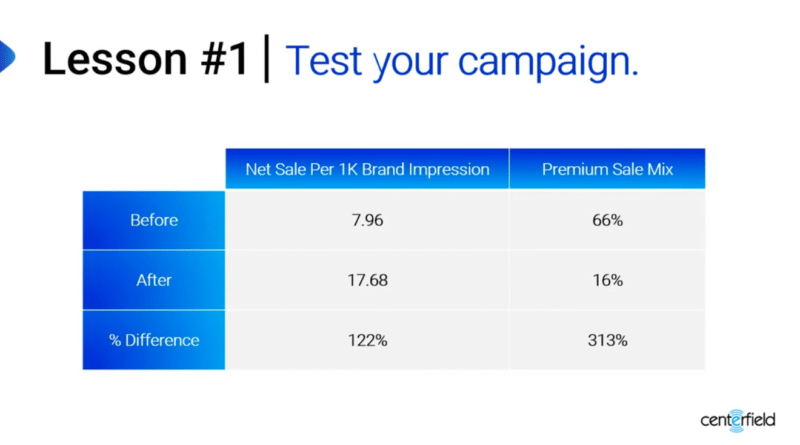Luanne Marek has been working in the digital customer acquisition space for 12 years. Throughout her six years leading the media buying team at Centerfield, Marek and her team have managed about a billion in ad spend, half a dozen Fortune 100 companies, several dozen Fortune 500 companies, and many other brands in the B2B, ecommerce, wireless and insurance industries.
At SMX Advanced, Marek shared ways they have been successful with some of the world’s leading brands by sharing six lessons her team has learned over the last several years.
1. Test your campaigns

Because branded campaigns are lower funnel and high converting, many brands don’t think there is a reason to make changes. Marek didn’t go into detail on what tests should be conducted, but she explains that on tests they performed, they were able to increase sales by 122%, as well as increase the quality of the sales by another 313%.
2. Measure with third-party tools

Once you decide to take the step and test your campaigns, making sure your data measurement is laid out correctly is the next step.
Too often they see tests flop because the data was not well laid out.
There is also a lot of emotional attachment to the results from the people that have been managing or working with the search campaigns. When that happens, Marek explains, it makes it difficult to look at the data in an unbiased way.
Marek suggests bringing in a third-party that specializes in this type of data analysis is the ideal way to:
- Correct baselines
- Create balance
- Use symmetrical data and measurement
- Ensure there are clear performance-based outcomes
- Allows the test to be run without emotional attachment to the readouts
3. Always be experimenting

Marek and her team perform thousands of tests a month on:
- Keywords.
- Campaign structure.
- Bidding strategies.
- Ad copy.
- Landing pages.
About 80% of the tests don’t pan out, and the winners typically win by only 5-10%.
When a winning test is found, scale it across other campaigns. Test additional iterations, and make sure you can measure it through to your end goal.
In the example they provide, Marek explains that while the submit button resulted in more form submissions, the see package button resulted in the most sales per page view and ultimately won by 33%.
4. Optimize your real estate

One of the areas Marek and her team see many brands fall apart is not taking full advantage of the real estate provided in the paid search results.
She suggests testing multiple branded positions.
Because other brands can show up in your results, adding a second paid branded position into the SERP will push those conquesting to the bottom of the page and instead of a user looking for your brand and seeing a compelling message from one of your competitors in between your paid search ad and your organic ad, they’ll only see your brand’s message.
Testing this method resulted in a 121% increase in sales and only a 9% increase in CPA for Marek and her team.
5. Personalize the experience

Adding a bunch of keywords to your landing page just isn’t enough anymore. It’s the bare minimum.
Marek suggests personalizing the entire experience. She suggests using a technology that can personalize and speak to the user about what’s important to them.
Her advice: Look for a technology platform that flows throughout the entire user experience, including the landing page. Choose one that offers contextualization and AI to personalize every step of the users’ journey to keep them engaged.
6. The buyer journey isn’t linear

The market is increasingly competitive. Users will often have three or more touch points before making a conversion.
Using automation and omnichannel optimization to meet the customer at every stage of the buying journey is the way forward, especially with the loss of cookies and other third-party data.
Marek gives us the example of using chat and SMS, which did not exist as a conversion channel a few years ago. Marek suggests getting ahead of the trends before your competition does and letting the consumer be reached where and how they want to.
3 key takeaways
- Set up tests.
- Validate results with a third-party vendor.
- Give consumers choice.
“There are many options out there, so test your current paid brand search strategy against others. And facilitating the testing is the next best option. And lastly, push the envelope on giving consumers choice. Just because one conversion path has worked well for you doesn’t mean it’s the only one you should focus on. It’s not about spreading the same conversions amongst alternatives,” Marek said.
The post Driving SEM success: Lessons learned from $1 billion+ in ad spend appeared first on Search Engine Land.


